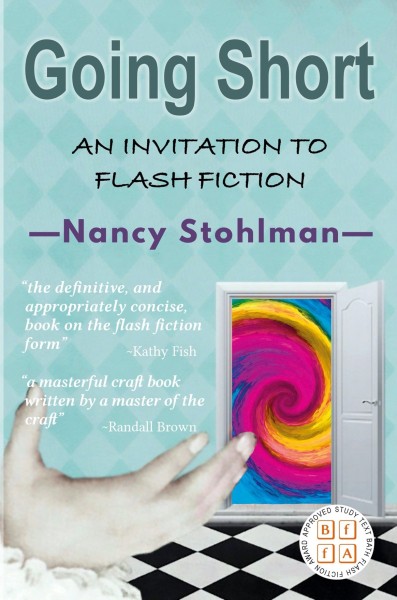
Congratulations, Nancy, on the publication of Going Short: An Invitation to Flash Fiction (Ad Hoc Fiction). At a pandemic reading recently, you mentioned that this book about flash is the culmination of nearly a decade’s devotion to the craft of flash. Will you share more about this project’s creation and evolution?
I loved that you were at that reading, April! An unexpected gift of 2020—Zoom readings!
And yes, this book has been in my head since 2010, and on paper since 2012. As I began teaching flash (both online and in physical classrooms), I was often asked to recommend flash craft books. At that time there was only the Rose Metal Press Field Guide to Flash Fiction, a wonderful book of essays on the form, and the anthologies.
Finally, I listened. If the book I wanted to recommend didn’t exist, then I would write it. I began writing it in 2012, but as the form grew and matured, and as Nancy-the-writer and Nancy-the-teacher grew and matured, Going Short ruptured and morphed and matured. I have rewritten, re-visioned, and recast it so many times over the last decade. It was a long but extremely rewarding birth. If I had another 10 years it would be a completely different book, I’m sure.
You help readers understand in Going Short that “flash fictions are stories under 1,000 words and that flash fiction is always telling a story, even if much of that story is implied.” You also talk about constraints—“Embracing the constraint is the true gift of flash fiction.”— and how flash has “created a new sort of genre freedom.” How does the gift of constraint and “narrative contortions” create something unique and yet recognizable as flash? Is there something more to flash than mere word count and a sense of story?
I love the nuance of this question. And I will defer to metaphor and ask: Why do we love cupcakes? I mean—they have the exact same ingredients as cake; they both have milk, eggs, butter, flour, frosting. Why not just have a slice of cake?
Flash fiction is the cupcake of literature. And it’s a totally different experience than a 3-layer wedding cake. Yes, they both have plot, character, story, poetry. But for me, the gift is in the intention. I love cakes and cupcakes, but I love them differently and for different reasons, and they require different visions and skills. Yes, we could produce gallons of batter and pour it into big sheet pans, and that is glorious. But we can also focus, shrink, and condense a tiny bit of our creative batter into a perfect circle, the delicate precision of a story you can hold in the palm of your hand.
How does microfiction differ?
Well, I guess that would make micro fiction the cake pop. One bite, and one bite only. But wow—what a bite.
What is the difference between the flash novel and the flash novella, Nancy?
Let me take you back to the beginning of my experience with the form(s). When I discovered flash fiction in 2007, I considered myself a novelist. The discovery rocked my world and made me wonder: could everything that flash fiction was doing for the short story be somehow applied on a bigger scale to a novel? A “flash novel” if you will? I did a ton of research and found no such term or concept. And just as flash fiction the term recast the vision of a short story, I wanted to create a term that would recast the vision of the novel, plant a flag for new thought. This has been the gift of flash fiction as a legitimate genre; people have always been writing tiny stories, but without a rallying cry or a term to gather under, they were seen as little more than party tricks and filler. My 2008 graduate thesis introduced the term “flash novel” and argued that we needed to legitimize and make space for a new vision of the novel. I argued that new thought requires new terminology.
So back to your question: In recent years terms like flash novella and novella-in-flash have also gained popularity, but in my mind these terms are all coming from the same impulse. Remember, there have been other terms for flash fiction as well: sudden fiction, nano fiction, etc. And while I am obviously partial to the term flash novel, I’m less invested in which term gains traction and more invested in the creation of new patterns of thought and the new possibilities that a term like this creates.
Will you share what you are working on now?
What am I working on now? Well, following the completion of any project I tend to go into a creative post-partum phase. So I’m hanging out there now, doing a lot of journaling and a lot of rereading and waiting. It can be a bit unnerving, but I’ve been here before, and I trust nothing more than I trust the creative process. It’s a bit like bird watching: I know that if I just wait, the new ideas will eventually relax and show themselves…
I’m also doing a lot of teaching, which is always inspiring, and I’m creating several new workshops for 2021: an extended Flash Novel Mastermind and a Going Short companion course for those who want to dive deeper into the concepts in the book.
But mostly I’m getting a lot of joy from finally watching the book totter off into the world. It was a long labor of love, and I’m so honored to finally share it with you.
P.S. If you want a signed book or to get on the mailing list for my upcoming classes: www.nancystohlman.com
Thank you, April!
Thank you, Nancy, and best wishes on your forthcoming work and plans—they sound exciting!
____________________________

Nancy Stohlman has been writing, publishing, and teaching flash fiction for more than a decade, and her latest book, Going Short: An Invitation to Flash Fiction (Ad Hoc Fiction, 2020) is her treatise on the form. Her other books include The Vixen Scream and Other Bible Stories, The Monster Opera, and Madam Velvet’s Cabaret of Oddities, a finalist for a 2019 Colorado Book Award. Her work has been anthologized widely, appearing in the W.W. Norton New Micro: Exceptionally Short Fiction, Macmillan’s The Practice of Fiction, and The Best Small Fictions 2019, as well as adapted for the stage. She teaches at the University of Colorado Boulder and around the world.
 April Bradley is a Durham, North Carolina-based writer of short-form fiction and creative nonfiction. Her work has been nominated for the Pushcart Prize, The Best of Small Fictions, The Best Microfiction, and the Best of the Net Anthology. Her writing appears in Blink Ink, CHEAP POP, Journal of Compressed Creative Arts, Narratively, NANO Fiction, Smokelong Quarterly, and Thrice Fiction, among others. She is the publisher and editor-in-chief of Feast & Flash and serves as an associate editor for Pidgeonholes and as a submissions editor for SmokeLong Quarterly.
April Bradley is a Durham, North Carolina-based writer of short-form fiction and creative nonfiction. Her work has been nominated for the Pushcart Prize, The Best of Small Fictions, The Best Microfiction, and the Best of the Net Anthology. Her writing appears in Blink Ink, CHEAP POP, Journal of Compressed Creative Arts, Narratively, NANO Fiction, Smokelong Quarterly, and Thrice Fiction, among others. She is the publisher and editor-in-chief of Feast & Flash and serves as an associate editor for Pidgeonholes and as a submissions editor for SmokeLong Quarterly.

 The core workshop of SmokeLong Fitness is all in writing, so you can take part from anywhere at anytime. We are excited about creating a supportive, consistent and structured environment for flash writers to work on their craft in a community. We are thrilled and proud to say that our workshop participants have won, placed, or been listed in every major flash competition. Community works.
The core workshop of SmokeLong Fitness is all in writing, so you can take part from anywhere at anytime. We are excited about creating a supportive, consistent and structured environment for flash writers to work on their craft in a community. We are thrilled and proud to say that our workshop participants have won, placed, or been listed in every major flash competition. Community works.